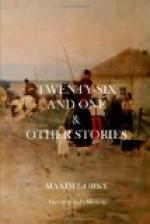Tchelkache frightened, astonished and furious threw himself backward, still seated on the sand, and leaning on his two hands silently gazed at him, his eyes starting from their orbits; the lad leaned his head on his knees and gasped forth his supplications. Tchelkache finally pushed him away, jumped to his feet, and thrusting his hand into his pocket threw the multi-colored bills at Gavrilo.
“There, dog, swallow them!” he cried trembling with mingled feelings of anger, pity and hate for this greedy slave. Now that he had thrown him the money, he felt himself a hero. His eyes, his whole person, beamed with conscious pride.
“I meant to have given you more. I pitied you yesterday. I thought of the village. I said to myself: ‘I’ll help this boy.’ I was waiting to see what you’d do, whether you’d ask me or not. And now, see! tatterdemalion, beggar, that you are! . . . Is it right to work oneself up to such a state for money . . . to suffer like that? Imbeciles, greedy devils who forget . . . who would sell themselves for five kopeks, eh?”
“Friend . . . Christ’s blessing on you! What is this? What? Thousands? . . . I’m a rich man, now!” screamed Gavrilo, in a frenzy of delight, hiding the money in his blouse. “Ah! dear man! I shall, never forget this! never! And I’ll beg my wife and children to pray for you.”
Tchelkache listened to these cries of joy, gazed at this face, irradiated and disfigured by the passion of covetousness; he felt that he himself, the thief and vagabond, freed from all restraining influence, would never become so rapacious, so vile, so lost to all decency. Never would he sink so low as that! Lost in these reflections, which brought to him the consciousness of his liberty and his audacity, he remained beside Gavrilo on the lonely shore.
“You have made me happy!” cried Gavrilo, seizing Tchelkache’s hand and laying it against his cheek.
Tchelkache was silent and showed his teeth like a wolf. Gavrilo continued to pour out his heart.
“What an idea that was of mine! We were rowing here . . . I saw the money . . . I said to myself:
“Suppose I were to give him . . . give you . . . a blow with the oar . . . just one! The money would be mine; as for him, I’d throw him in the sea . . . you, you understand? Who would ever notice his disappearance? And if you were found, no inquest would be made: who, how, why had you been killed? You’re not the kind of man for whom any stir would be made! You’re of no use on the earth! Who would take your part? That’s the way it would be! Eh?”
“Give back that money!” roared Tchelkache, seizing Gavrilo by the throat.
Gavrilo struggled, once, twice . . . but Tchelkache’s other arm entwined itself like a serpent around him . . . a noise of tearing linen,—and Gavrilo slipped to the ground with bulging eyes, catching at the air with his hands and waving his legs. Tchelkache, erect, spare, like a wild beast, showed his teeth wickedly and laughed harshly, while his moustache worked nervously on his sharp, angular face. Never, in his whole life, had he been so deeply wounded, and never had his anger been so great.




